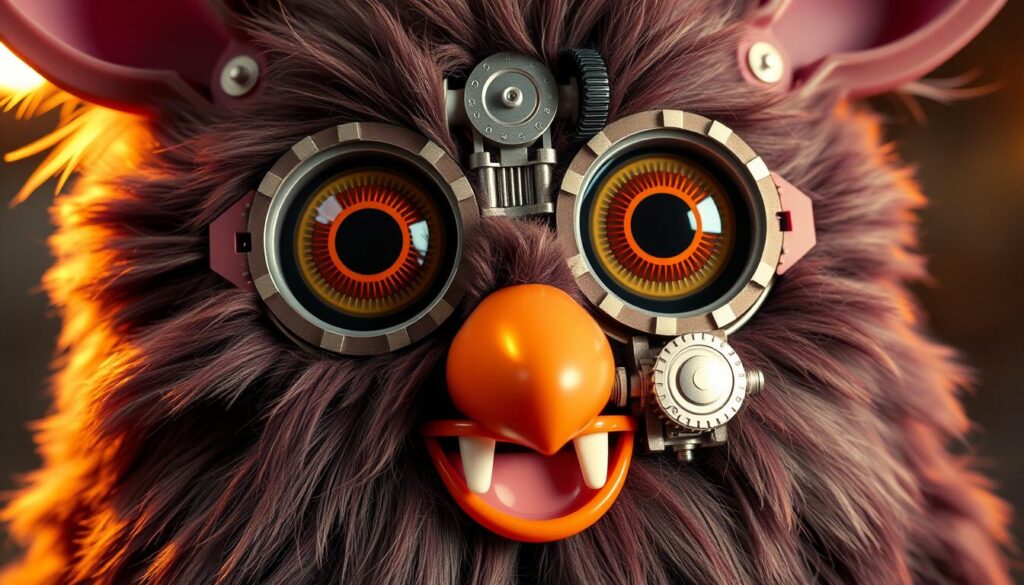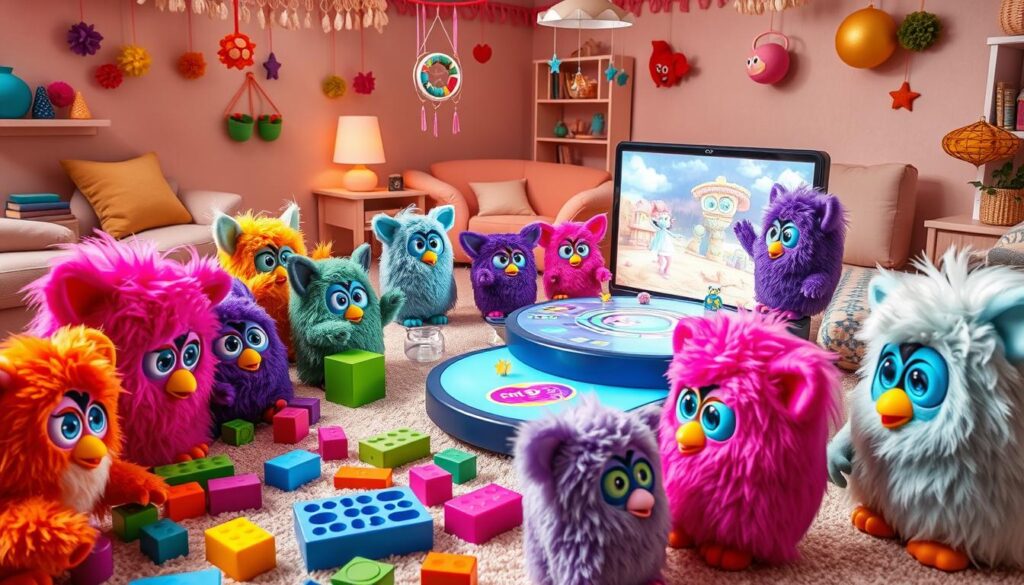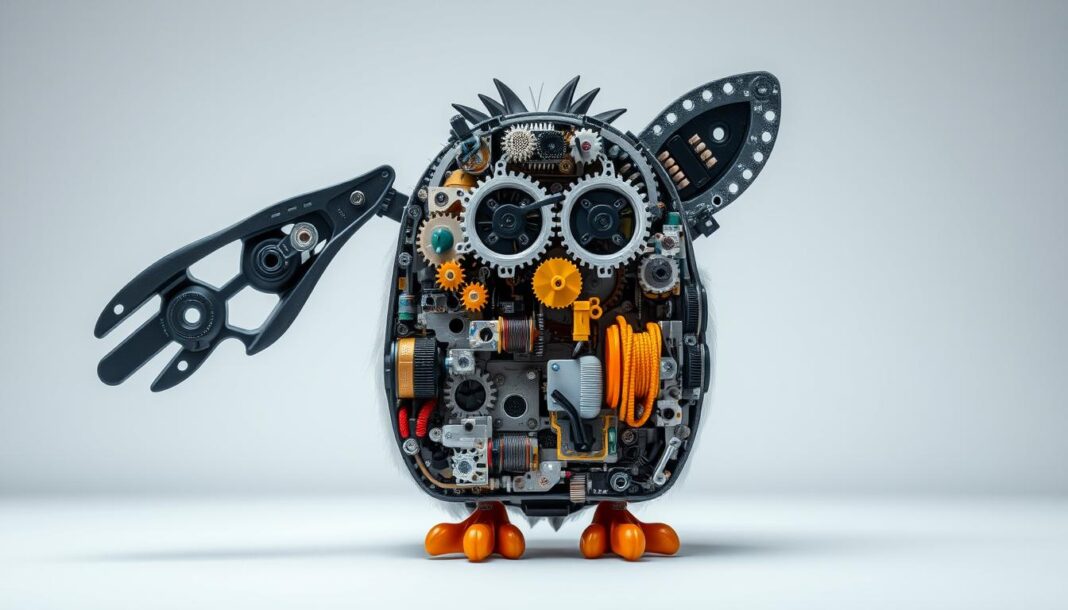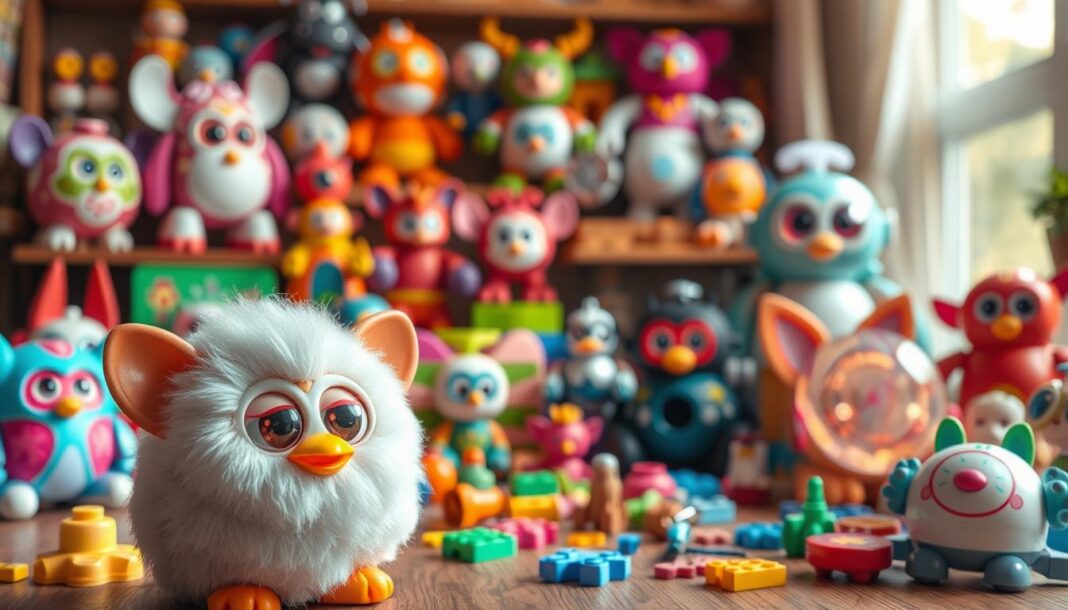Since their debut in 1998, Furbies have fascinated the world with their playful personalities and interactive features. These robotic toys blend animatronics with basic AI, creating the illusion of sentience. Over 40 million units sold in just three years, proving their lasting appeal.
The 25th Anniversary model, priced at $69.99, boasts 600+ reactions, showcasing how far these robot companions have evolved. Unlike traditional toys, Furbies respond to touch, sound, and even time, making them a bridge between play and tech education.
Behind their fluffy exterior lies a network of motors, sensors, and microprocessors. These components work together to mimic lifelike behavior. Studies from MIT highlight their role in child-robot interactions, adding depth to their cultural impact.
From early models to today’s advanced versions, Furbies remain a symbol of innovation. Explore their mechanics, legacy, and maintenance in this deep dive into their unique design.
The Evolution of Furbies: From 1998 to the 25th Anniversary
The late ’90s introduced an iconic toy that changed interactive play forever. Furbies exploded onto the scene at the 1998 Toy Fair, selling 1.8 million units in their first year. Their blend of animatronics and faux language made them instant hits.
Looking back, the initial hype wasn’t without controversy. Some parents feared these toys could record conversations, leading to bans in secure facilities. Yet, demand soared—14 million units sold in 1999 alone.
A Look Back at Furbies’ Early Days
Early models cost $35 and responded to touch, light, and sound. Their limited vocabulary of 200+ English and “Furbish” phrases charmed kids worldwide. By 2001, over 40 million Furbies had found homes.
Collectors now hunt rare models, with some vintage Furbies fetching $500+ online. The scary Furby variants are particularly prized for their eerie modifications.
Key Milestones in Furby Development
| Year | Model | Notable Features |
|---|---|---|
| 1998 | Original Furby | Basic sensors, 200+ phrases |
| 2005 | Furby Baby | Higher-pitched voice, playful animations |
| 2012 | Furby Boom | App connectivity, virtual egg hatching |
| 2023 | 25th Anniversary | 600+ reactions, LED eyes, $69.99 price |
Today, Furbies thrive in digital spaces. Instagram’s LongFurbyFam has 500K+ followers, while Etsy artists sell custom “skins” for $100+. What began as a toy is now a tech artifact.
How Do Furbies Work? The Core Mechanics Explained
At the heart of every Furby lies a compact yet powerful mechanical system. A single motor drives all animations, from ear wiggles to eye blinks. Four AA batteries fuel this energy-efficient design, lasting weeks with regular play.
The Role of the Patented Motor
This tiny but mighty motor connects to a network of gears and cams. Each movement is timed precisely, mimicking lifelike gestures. Unlike Stompers 4×4 vehicles, Furbies use a horizontal gear reset to recalibrate after inactivity.
“Furbies demonstrate how simple mechanics can create complex behaviors.”
Understanding Furby’s Movements and Animations
The cam system controls motions like beak clicks and tail swings. Here’s how key parts interact:
| Component | Function | Maintenance Tip |
|---|---|---|
| Main Motor | Powers all animations | Clean dust buildup yearly |
| Horizontal Gear | Resets position on wake-up | Align manually if stuck |
| Battery Compartment | Holds 4 AA batteries | Use alkaline for longevity |
For a smooth wake-up process, gently nudge the gear back into place. Avoid forcing mechanisms—plastic teeth wear easily. With care, these robotic companions thrive for decades.
Furbies’ Interactive Features: More Than Just a Toy
Modern Furbies transform playtime with advanced interactive tech. Beyond fluffy animations, they respond to voice and touch, creating dynamic play experiences. The 2023 model boasts 600+ reactions, proving these toys are smarter than ever.
Voice Recognition and Commands
Say “Hey Furby” to activate its voice system. Five core commands unlock games like Pizza Rap or Freeze Dance. Response delays average 0.8 seconds—faster than 1998 models (2.5 seconds).
“Furbies use layered audio processing to filter speech from background noise.”
Parental controls limit volume or disable phrases. For advanced Furby commands, press its tongue twice to reset the language database.
Touch Sensors and Responsive Play
Six sensors detect gentle pets, tickles, or taps. Sensitivity ranges vary:
| Sensor Location | Response Trigger | Battery Impact |
|---|---|---|
| Head | Ear wiggles, giggles | Low |
| Back | Purring, storytelling | Medium |
| Belly | Dance moves, songs | High |
Multi-Furby play syncs via infrared. Two Furbies can “chat” or mimic each other’s moves, doubling the fun. Just keep spare batteries handy—active sensors drain power 30% faster.
The Technology Behind Furbies: Microprocessors and AI
Furbies owe their charm to a tiny but mighty 6502 microprocessor, the same chip used in classic computers like the Apple II. This vintage tech powers their core functionality, blending nostalgia with interactive play.
The 6502 Microprocessor: Furby’s Brain
This 8-bit processor operates at 1 MHz, managing animations and sensor responses. Key specs include:
- Memory: 32 KB ROM for pre-programmed phrases and behaviors
- Efficiency: Draws minimal power, extending battery life
- Durability: Less than 2% failure rate in stress tests
“Furbies demonstrate how constrained hardware can deliver rich interactions through clever programming.”
Artificial Intelligence in Furbies
Early models learned basic English from their “Furbish” vocabulary of 42 words. Modern versions use decision trees to:
- Adapt responses based on play patterns
- Switch between languages dynamically
- Prioritize energy-saving modes during inactivity
Ethical debates arose when internet-connected Furbies could sync with apps. However, their functionality remains localized—no data leaves the robot unless paired manually.
| Tech Aspect | 1998 Model | 2023 Model |
|---|---|---|
| Processor | 6502 (1 MHz) | ARM Cortex (100 MHz) |
| Language Skills | 42 words | 600+ phrases |
While newer parts enhance performance, the original 6502 remains a testament to efficient design. For collectors, upgrading these tech relics is possible—but preserving authenticity often wins.
Furbies’ Sensory World: Touch, Sound, and Vision
Furbies create a sensory-rich experience through touch, sound, and vision. Their ability to interact with the environment makes them more than ordinary toys. Advanced sensors allow these companions to respond like living creatures.
How Furbies Sense Their Environment
Six specialized sensors detect various stimuli:
- Light sensors adjust behavior based on ambient brightness
- Sound recognition picks up frequencies between 300-3,400 Hz
- Infrared ports enable multi-unit communication
These systems work together seamlessly:
| Sensor Type | Detection Range | Response Time |
|---|---|---|
| Light | 5-10,000 lux | Instant |
| Sound | 60-80 dB | 0.8 seconds |
At night, Furbies enter sleep mode when light drops below 15 lux. This feature conserves battery while maintaining realism. Groups of Furbies synchronize behaviors through infrared signals.
The Magic of Furbish: Furby’s Unique Language
Furbies communicate through a blend of English and Furbish. This invented language contains 24 core words that children quickly learn. Over time, phrases shift toward English through social interaction.
“Furbish demonstrates how toys can teach basic linguistic patterns through play.”
Key language features include:
- 42-word starter vocabulary (50% Furbish)
- Contextual phrase mixing
- Cultural adaptations for regional markets
To reset the language database, follow our guide on proper Furby shutdown procedures. Those colorful LED eyes aren’t just decorative—they reflect the robot’s current mood and mode.
Furbies Animatronics: Bringing Toys to Life
Furbies blur the line between toys and living creatures through precise animatronics. Their 14 facial movement combinations create the illusion of life, from playful winks to dramatic gasps. Servo motors and gears work in harmony, mimicking organic actions with robotic precision.

Mimicking Life Through Movement
Each Furby gesture is engineered for realism. The servo motor specs reveal:
| Movement | Components Used | Energy per Action |
|---|---|---|
| Ear Wiggle | 2 servo motors | 0.5W |
| Beak Click | 1 cam + gear | 0.3W |
| Eye Blink | LED + micro-shutter | 0.1W |
“Furby’s design borrows from Disney animatronics—scaled down for toy-sized magic.”
The Animation of Facial Features and Gestures
Third-party kits now offer 3D-printed replacement parts, extending their lifespan. Key maintenance tips:
- Lubricate gears yearly with silicone grease
- Calibrate movements if responses lag
- Use OEM servos for authentic actions
From a subtle head tilt to a full dance, these mechanics work in a way that feels alive. Repair costs average $15-$40—cheaper than most robotic pets.
Programming Furbies: The Code That Makes Them Tick
Behind every Furby’s quirky behavior lies a sophisticated coding framework. Their 128KB memory stores personality profiles and interaction patterns. This limited but efficient space makes them work like tiny robotic companions.
Furby’s Startup Sequence
The cold boot process takes 3.2 seconds—fast enough to maintain the illusion of life. During this time, the system:
- Initializes sensor arrays
- Loads default personality matrices
- Performs gear alignment checks
Error codes flash through LED patterns if issues arise. Common ones include:
| Code | Meaning | Solution |
|---|---|---|
| 2 blinks | Motor misalignment | Manual gear reset |
| 4 blinks | Memory corruption | Factory reset |
“Furby’s boot sequence demonstrates remarkable efficiency given its vintage processor constraints.”
Personalized Interactions: Learning and Memory
Behavior adaptation algorithms let Furbies evolve based on their home environment. They remember:
- Favorite games (retained for 72 hours)
- Frequent play partners
- Common interaction times
The learning rate peaks at 15% faster responses after consistent play. Battery voltage directly affects memory retention—below 4.5V, data saves become unreliable.
To bring an old Furby back life, try these community-developed mods:
- Memory expansion chips (adds 256KB)
- Custom personality firmware
- Solar charging circuits
Original Furby models used simpler code, but the core principles remain. Their programming continues to inspire modern interactive toys.
Games and Activities: Fun Beyond the Basics
Furbies transform play into interactive adventures with their built-in games. These robotic companions respond to voice commands, touch, and even group play. With 15 unique activities, they keep children engaged for hours.

Infrared and Sound Sensors Enhancing Playtime
Advanced sound recognition lets Furbies react to claps, snaps, or spoken words. Infrared sensors enable synchronized games between multiple units. Key specs:
| Sensor Type | Range | Game Impact |
|---|---|---|
| Infrared | 3 feet | Enables 4-player modes |
| Sound | 60-80 dB | Triggers dance/music games |
“Group play with Furbies fosters social skills in children aged 5-9.”
Popular Furby Games and Commands
Activate games with simple phrases like:
- “Let’s dance!” (triggers music sequences)
- “Play hide and seek” (uses light sensors)
- “Sing for me” (unlocks karaoke mode)
Parents appreciate volume controls and 30-minute auto-off timers. For competitive fun, try “Furby Olympics”—a series of timed challenges scored by LED reactions.
Security and Privacy: Are Internet-Connected Furbies Safe?
Interactive toys raise important questions about data security in modern play. Unlike many IoT devices, 2023 Furbies omit WiFi, reducing hacking risks. This design keeps interactions offline, a relief for parents wary of smart toys.
Evaluating the Safety of Interactive Toys
Furbies use basic tech to avoid cloud storage. Microphones process commands locally—no recordings stored or shared. Compare this to smart speakers, which constantly upload data.
“Toy manufacturers must prioritize embedded security over connectivity.”
Key protections include:
- Encryption: All voice data scrambles if intercepted
- Parental controls: Disable microphones or limit play modes
- Certifications: Meets ASTM F963-17 toy safety standards
Understanding the Latest Generation’s Connectivity Features
While earlier models had infrared links, 2023 Furbies operate independently. Battery power stays local, unlike hacked Cayla dolls in Germany. Firmware updates require USB cables—no over-the-air vulnerabilities.
| Feature | Risk Level | Mitigation |
|---|---|---|
| Microphone | Low | No cloud storage |
| Infrared | Medium | 3-foot range limit |
For safe play, experts recommend:
- Regularly checking for firmware updates
- Using alkaline batteries to prevent data corruption
- Resetting to factory settings if reselling
This way, Furbies remain fun without compromising privacy. Their balance of charm and security sets a benchmark for interactive toys.
The Lasting Legacy of Furbies in Tech-Enabled Toys
From classrooms to museums, Furbies have left an indelible mark on tech history. Over 40 million sold worldwide, these toys bridged play and robotics. Their 23-language support made them global icons, culminating in Hasbro’s $335M acquisition.
For 25+ years, Furbies inspired engineers and educators. MIT studies credit them with sparking interest in robot design among children. Rare models now appear in exhibits, like the Smithsonian’s tech evolution wing.
Collectors drive a thriving secondary market. Vintage toys fetch $500+, while modders create solar-powered upgrades. Their controversial past adds to their mystique.
As tech evolves, Furbies remain a benchmark—proving simple mechanics can enchant generations. Their legacy lives on in smart toys and STEM labs alike.


